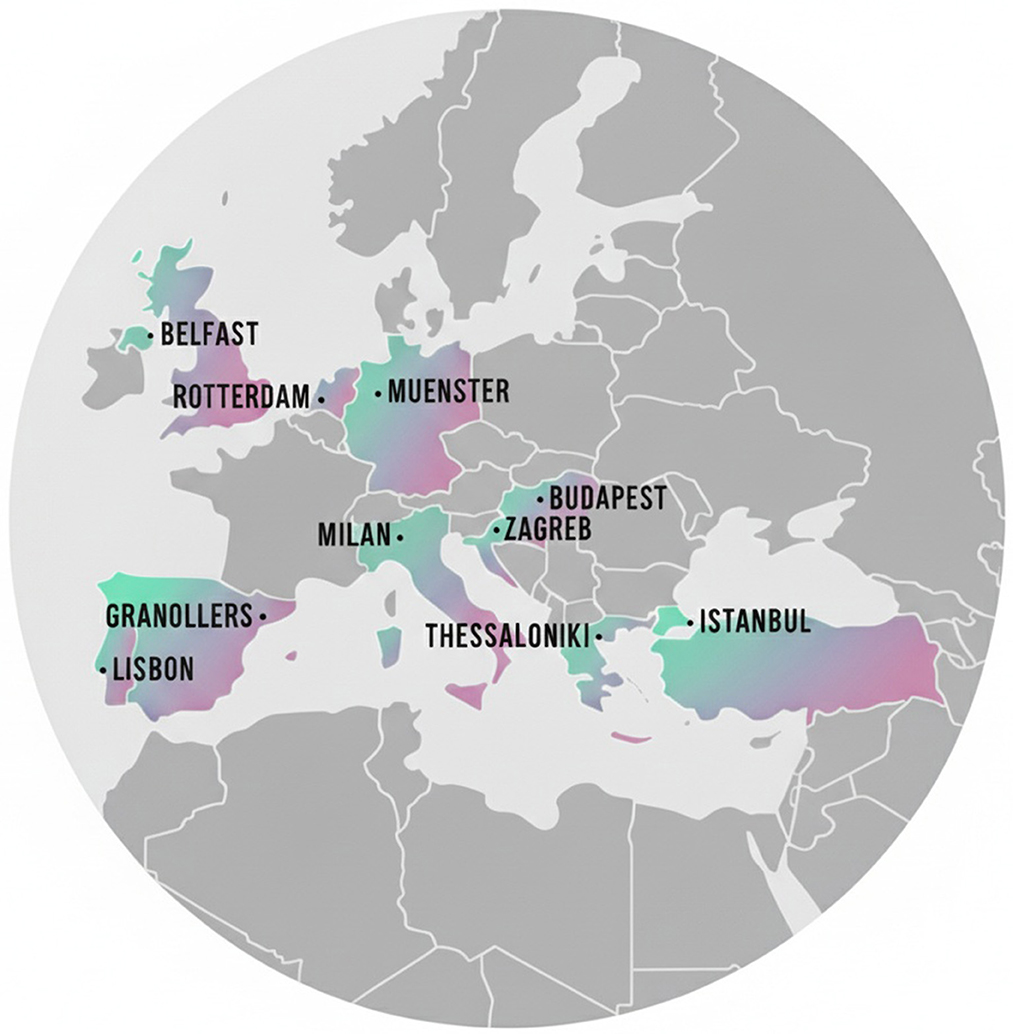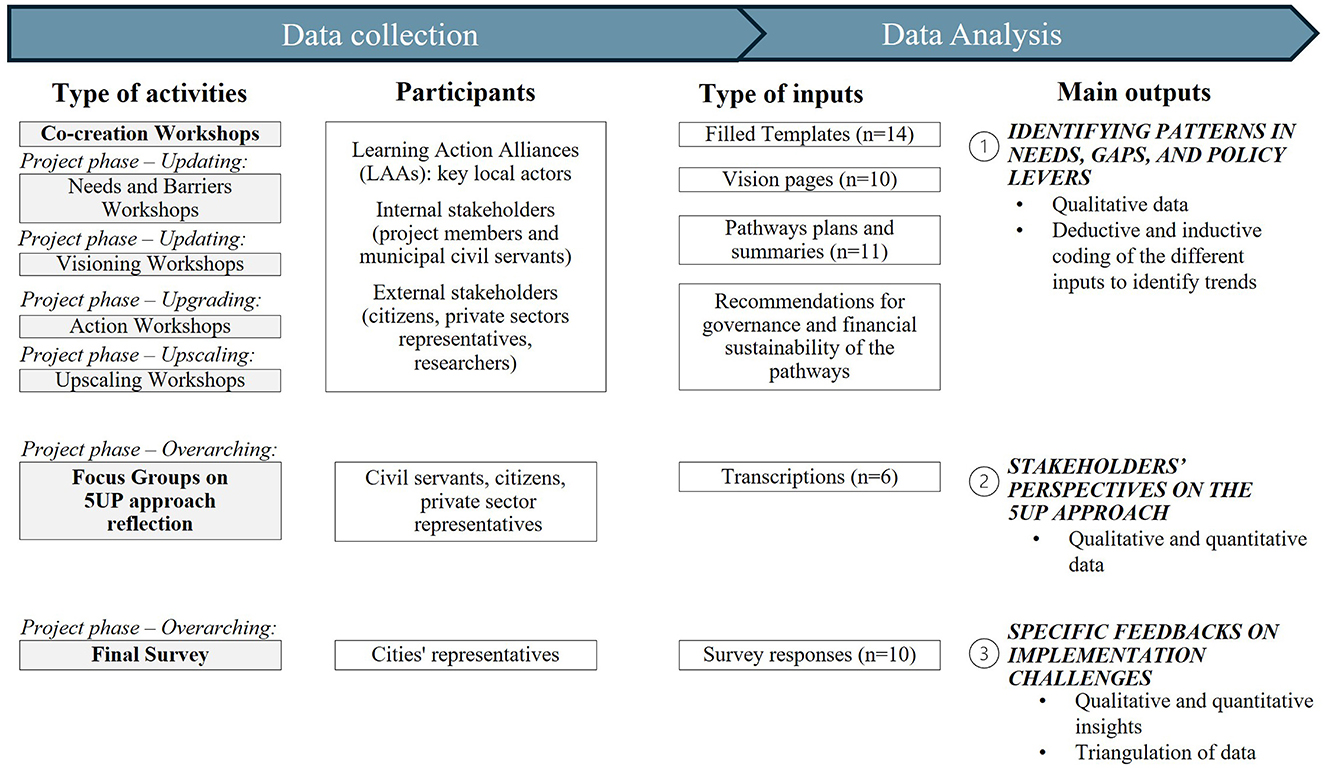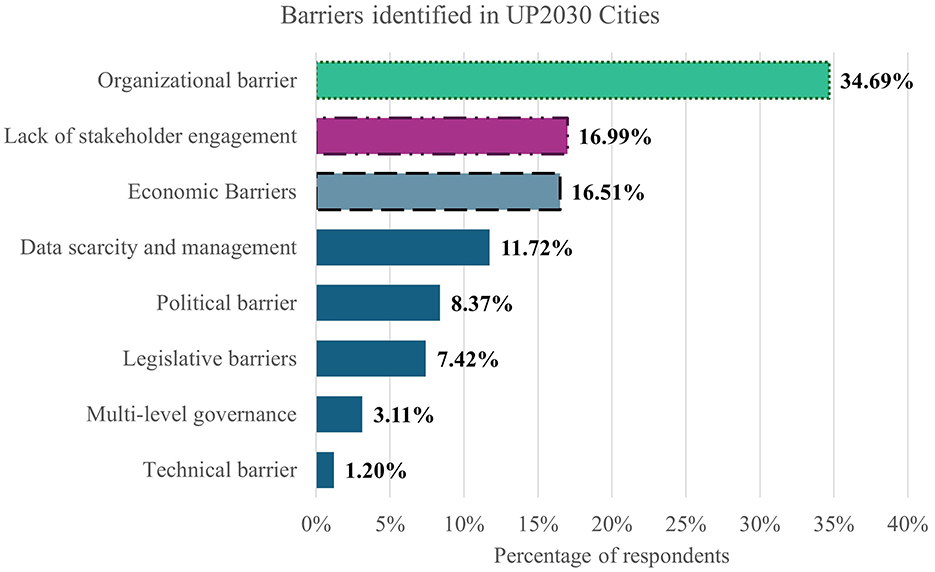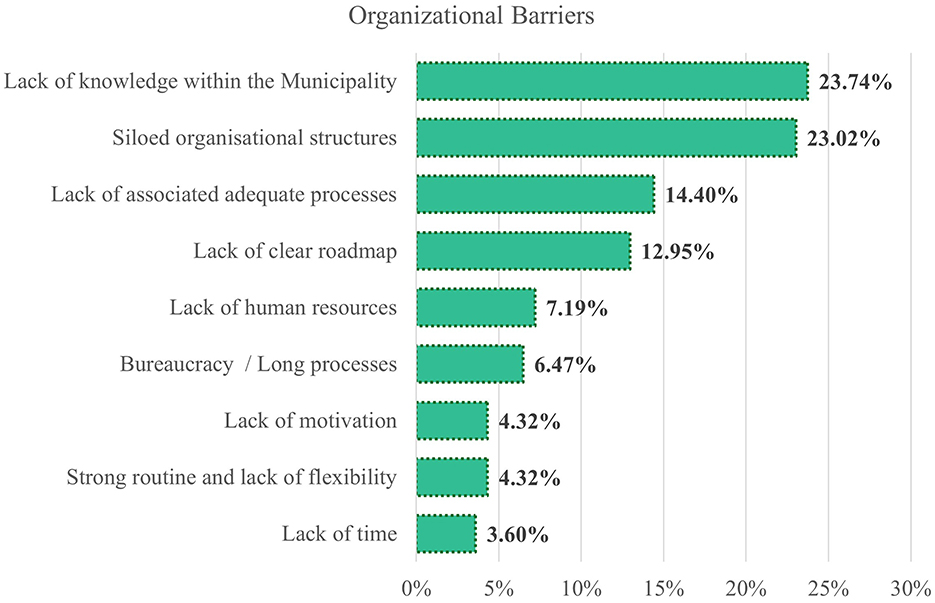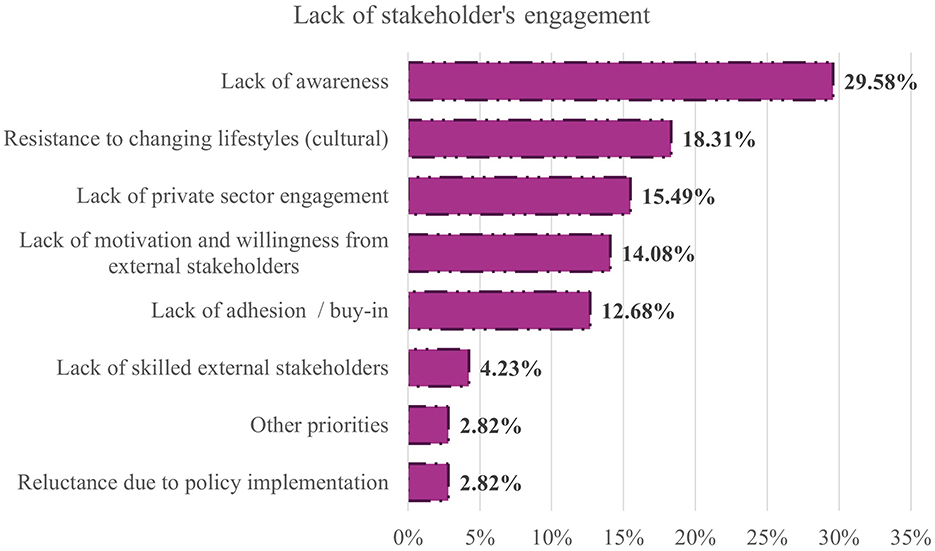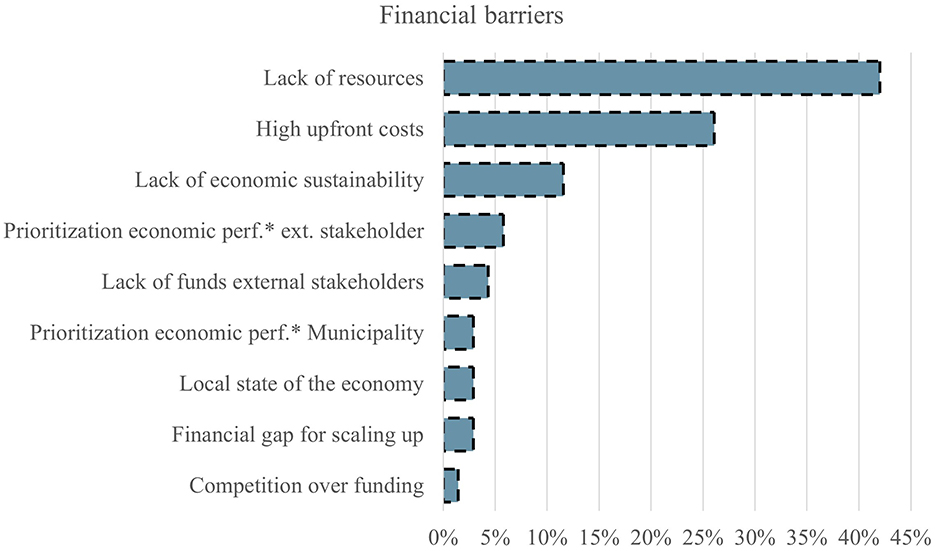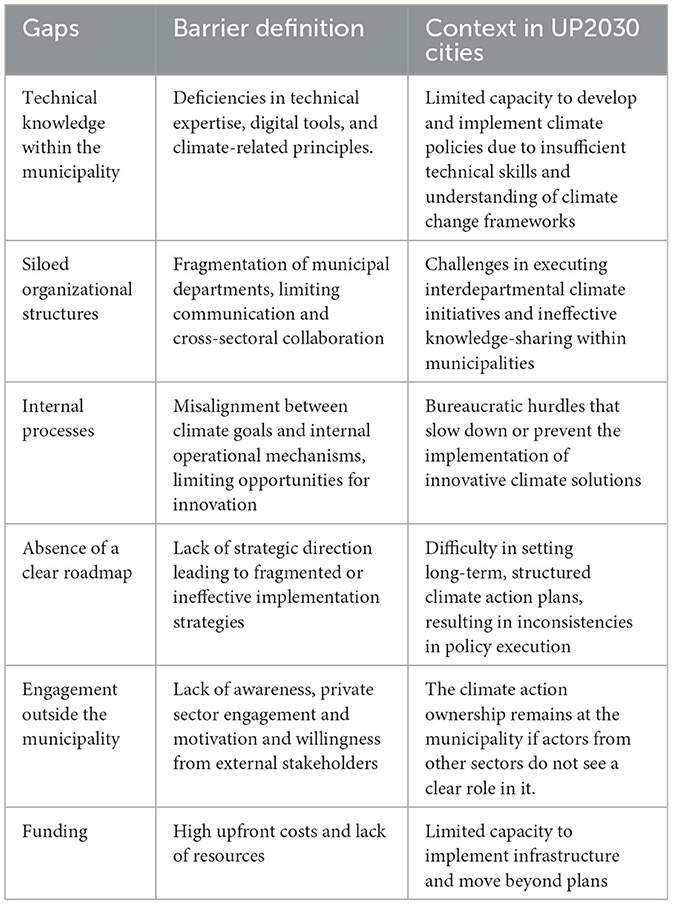- 1Urban Systems Engineering, Fraunhofer Institute for Industrial Engineering IAO, Stuttgart, Germany
- 2Resilient Cities Network, Amsterdam, Netherlands
- 3Research Institute Just and Resilient Carbon Neutral Places, Universitat Internacional de Catalunya, Barcelona, Spain
- 4University of Stuttgart IAT, Stuttgart, Germany
Achieving climate objectives in cities requires a significant acceleration of current efforts and deep structural changes in how policies, programs, and projects are implemented. Despite commitments to climate action at the local level, cities continue to face challenges in delivering tangible outcomes, as implementation is project-led, output oriented, and siloed. Climate policy and planning frameworks often articulate ambitious cities visions and agendas, sometimes supported by funding schemes, yet falling short in translating these objectives into consistent implementation pathways. This study proposes the 5-UP Framework, a new methodological approach to respond to implementation gaps in climate action, fostering consistent and systemic action in cities. The framework has been built after assessing existing literature, climate plans, and implementation barriers across ten European cities using structured surveys, workshops, and focus groups. The findings revealed that these gaps can occur before, during, and after action is carried out. To address this, the 5-UP Framework links implementation to five dimensions: UPDATING city needs aligned with actions, UPSKILLING knowledge and agents of change, UPGRADING through piloting, embedding UPSCALING of actions, and UPTAKING key mechanisms and knowledge. With cities' growing awareness of climate change impacts and persistent implementation gaps, this paper shows that support should extend beyond financing and project outputs. It should also guide capacity building, human agency, prototyping, and upscaling to mainstream climate action systemically.
1 Introduction
The notion of urban action has become central in global discourses when it comes to tackling climate change (Laine et al., 2020; Seto et al., 2021; Corrêa do Lago et al., 2023) even though climate targets are agreed at the higher levels. As national governments are lagging behind in achieving climate targets, the emergence of cities as “saviour of the planet” constitutes a new trend in academic discourses and policy circles (van der Heijden, 2018) in view of cities' perceived capacity to deliver more ambitious goals compared to nation states (Laine et al., 2020).
However, there is a long way between policy adoption and policy implementation. The former implies goals and intended commitments, while the latter requires tangible government actions that can activate underlying resistance from opposing interests and require the allocation of both organizational and financial resources (Ryan, 2015). With pressure put on cities, the IPCC has acknowledged them as crucial actors in addressing climate change (Aust, 2019; Dodman et al., 2023; Song et al., 2024) and climate emergencies taking place in urban areas, achieving the climate objectives will not be easy for municipalities. It requires a substantial acceleration of existing efforts, but also deep changes in how cities approach and implement their policies, programmes, and projects (Liakou et al., 2022; Istrate et al., 2023). For instance, meeting the global push toward net-zero emissions requires for cities trillions USD in annual investments until 2030 to fund climate-resilient infrastructure; at the same time, they must cope with other local demands such as displacement, aging, or damaged essential infrastructure, among other challenges (UN-Habitat, 2024).
Regarding governance instruments, despite numerous cities acknowledging the importance of climate action in planning decisions, climate action plans are only mandatory in few countries such as Ireland, the UK, or France and remain absent in many cities in Europe and around the world (UN-Habitat, 2024). Previous research has periodically analyzed climate plans across Europe, unveiling poor quality (Reckien et al., 2023). Others have analyzed the integration of adaptation and mitigation in those plans, pointing out many critical trade-offs, inconsistencies, and a limited understanding of the need for stronger integration between the two (Grafakos et al., 2020). Ideally, such integration should generate synergies, leading to actionable urban measures that advance both adaptation and mitigation simultaneously (Landauer et al., 2019). However, mitigation has often a prominent role despite the evidence on the significance of resilience in integrating diverse social, political, and economic priorities for urban climate response (Kythreotis et al., 2020). The most recent quality assessment of European climate plans exposes how the political goals and climate risks are not always aligned, and this consistency gap is one of the main issues of climate policies lack of efficiency in Europe (Reckien et al., 2023). This explains past and current resilient trade-offs embedded within climate actions (Sharifi, 2020; Chelleri and Baravikova, 2021), questioning the price to pay for climate neutrality, especially when it exacerbates existing inequalities while provoking green gentrification (Anguelovski et al., 2022; Rocco, 2022).
Despite extensive research on urban climate governance, limited understanding remains into how governance models can effectively support decision-making across multiple levels (Stehle et al., 2022; Lwasa et al., 2023). Advancing integrative climate action calls for better coordination and coherence reshaping actor relationships (O'Brien, 2018), leveraging data and modeling tools (Huovila et al., 2022), enhancing systemic understanding of urban dynamics to guide more informed processes (Seto et al., 2017; Frantzeskaki et al., 2021), and moving from visions to detailed and technical plans that can be implemented (Corfee-Morlot et al., 2012; Parks, 2020; Huovila et al., 2022).
Indeed, it is recognized that cities can act on a wide range of policy areas, if they are within their jurisdiction, and can dispose of a wide range of tools (Bulkeley et al., 2009; Ryan, 2015). Due to the smaller size and less rigid structures in cities, these governments can often make decisions more swiftly and adjust more readily to changing conditions than larger, more centralized regional or national bodies; however, this capability must be contextualized within the specific limitations that cities also face, as their smaller sizes do not always mean effective decision-making power and funding for implementations (Puppim de Oliveira, 2009). Their often-siloed structures prevent overarching themes, such as climate, to being handled in an integrated way and the departments taking care of climate action have often insufficient power, capacity, and authority to effectively coordinate policy across the city.
As a result, climate resilience strategies and actions are typically implemented in a fragmented manner (Bulkeley et al., 2009) and even where cities enjoy some flexibility in adopting policies, local-level climate action, often focusing on the neighborhood as the implementation scale (Atkinson, 2008; Baffoe, 2019), remains constrained by factors such as limited authority, high initial investment requirements, fragmented funding sources, conflicting policy priorities, overlapping institutional responsibilities, informality in governance structures, and isolated approaches to climate planning (Lwasa et al., 2023). Across all these dimensions, jurisdictional and institutional scales influence how adaptation and mitigation strategies, projects, and tasks are implemented at the management level creating both challenges and opportunities (Landauer et al., 2019) and influencing the decisions that are made when it comes to the implementation of tangible measures in the urban realm. Analysis of the reduction commitments under the Covenant of Mayors by Lucchitta et al. (2023) reveals a tendency for cities to prioritize measures with shorter implementation timeframes (i.e., public lighting, municipal buildings), potentially overlooking more impactful actions with longer timelines, such as information-based measures. Addressing the existing fragmentation between initiatives and their tendency to operate in isolation or lack longevity is key to drive widespread and sustained transformation (Turnheim et al., 2018; Geels, 2019).
Considering the above-mentioned climate policies shortcomings and the persistent gap between policy adoption and implementation, the weak connections between resilience, justice, and carbon neutrality in climate plans underscore the need for a more integrated multi-scalar approach. This paper addresses these implementation gaps by proposing a methodological framework to guide climate action across all phases. The research is structured around the following questions:
- Which are the implementation gaps in climate action in European cities?
- How implementation can be supported along all phases to align the planning, prototyping, upscaling, and mainstreaming of climate actions and solutions?
The central method of analysis in this research has been the 5-UP Framework. The latter was developed under the UP2030 project where 10 cities (see Figure 1) explored the opportunities for city and neighborhood planning instruments for integrated action toward climate neutrality, resilience, and social justice. The 5-UP Framework is a systems thinking approach that allows cities to analyse climate action implementation across five interlinked dimensions: needs, policies, and instruments (UPDATE), capacity building (UPSKILL), prototyping and piloting (UPGRADE), replicating, rolling out, or transferring success (UPSCALING) and engagement, communication, and dissemination of key mechanism and knowledge (UPTAKE) (see full description in the Annex). The framework was inductively derived from both our literature review and the empirical assessment of barriers faced by cities: existing studies repeatedly highlighted fragmentation, insufficient technical capacity, lack of piloting opportunities, weak scaling, and limited uptake of knowledge into practice (Bulkeley et al., 2009; Corfee-Morlot et al., 2012; Haupt et al., 2020; Huovila et al., 2022). These recurring gaps informed the five dimensions, which are interlinked to foster a systemic process rather than isolated actions. The 5-UPs deliberately avoid focusing on technical specifics, making it adaptable across different climate action aspects; it emphasizes mitigation, adaptation, and social justice as pillars to address climate action. This allows cities to tailor the framework to their local context and neighborhoods, while developing and refining their own transition roadmaps and pathways in a more integrated manner. This becomes crucial as “Technological fixes” and isolated interventions have frequently resulted in short-term outcomes, highlighting the need for a fundamental restructuring of underlying systems (Farla et al., 2012). In this context, innovation becomes necessary both to challenge well-established systems, such as business-as-usual scenarios (Geels, 2019), and to facilitate the implementation of climate action in cities. However, the success of climate action implementation depends not only on political layers but also on actions at the practical and personal level as this can activate human agency in ways that shift norms and institutions (O'Brien, 2018).
This paper is structured into five sections. The introduction provides an overview of the relevant literature and contextualizes the problem. Section 2 (Methods) outlines the research design, with a focus on the needs and barriers assessment and the application of the 5-UP Framework. Section 3 presents the research findings from the pilot cities of UP2030, while Section 4 discusses these results in relation to existing literature. Finally, Section 5 offers the main conclusions of the study.
2 Research design and methods
To address and respond to the above-mentioned research questions, the research design was conceived around the evidence gathered from 10 neighborhood case studies (Belfast, Budapest, Granollers, Istanbul, Lisbon, Milan, Muenster, Rotterdam, Thessaloniki, and Zagreb) using the 5-UP Framework. With a multi-case qualitative style, the research is grounded in the Learning Action Alliances (LAAs) framework (Dudley et al., 2013), an open and transparent setting where stakeholders from diverse organizations, often with different perspectives, collaborate to co-develop a shared vision grounded on their collective goals and aspirations (Maskrey et al., 2020). LAAs place greater emphasis on generating tangible results, driving behavioral change among stakeholders and institutions, and shaping broader policy and regulatory frameworks (Newman et al., 2011; O'Donnell et al., 2018). For this study, the LAAs were set up at multiple scales in response to the case study cities' ambitions at city or neighborhood level.
The cities participating in this research have a long history of climate action and some of them already have instruments in place, such as the Climate City Contracts (CCCs)—collaborative processes and roadmaps endorsed by the European Commission that guide cities in working with key stakeholders toward a shared climate neutrality agenda (Littek and Wildman, 2022). Despite these efforts and ongoing initiatives, the cities still face challenges in demonstrating tangible evidence of climate action at city and neighborhood scale. Furthermore, some participants lacked full clarity on the distinction between mitigation and adaptation efforts in response to climate change, as well as on the importance of integrating social justice to prevent maladaptation and green gentrification in these processes. Overall, efforts were often scattered, short-term, or isolated in scope, underscoring the need for a systemic approach that links different stages of implementation into a coherent process. To this end, the 5-UP Framework supported them with the operationalization of actions across its five interlinked dimensions, ensuring a holistic view toward systemic change (see Figure 2).
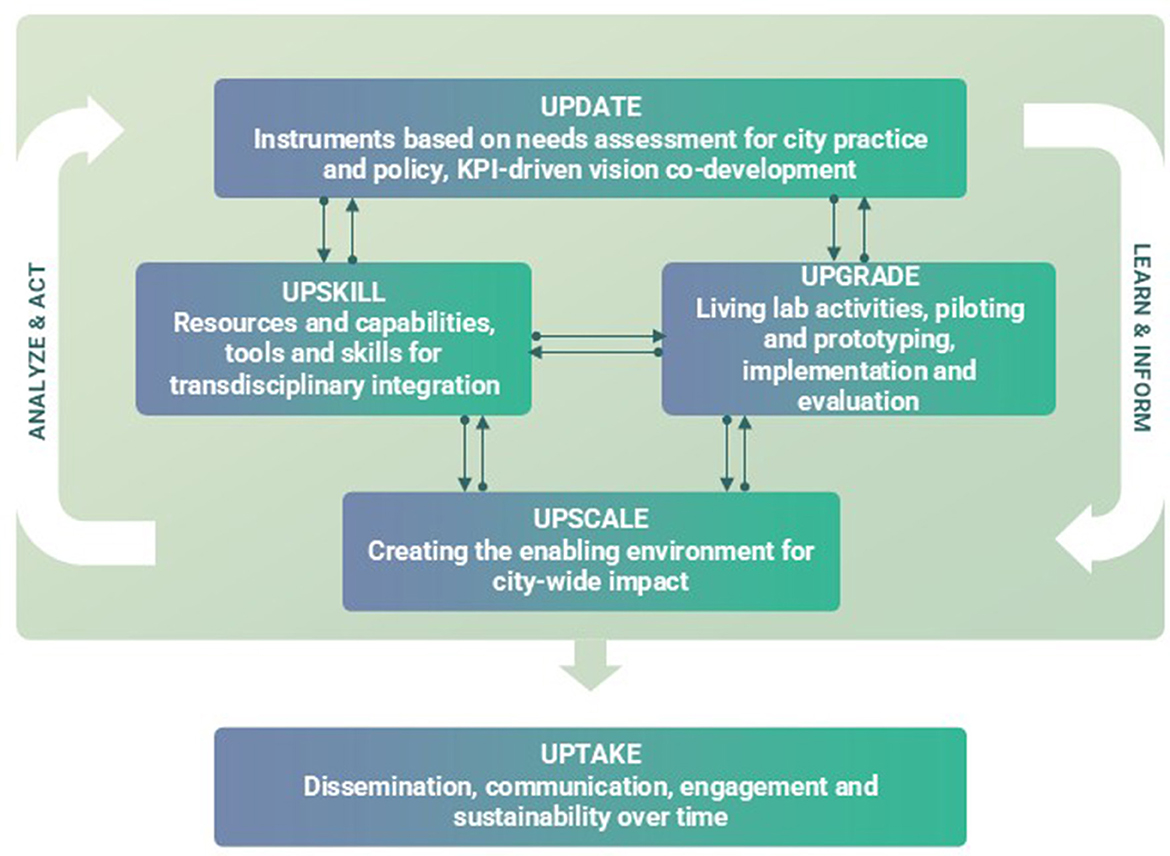
Figure 2. 5-UP approach diagram. Adapted from UP2030 (2022).
1. UPDATE—Needs, policies, and instruments
Starting with a policy analysis and needs assessment for the participant cities, this dimension included the stakeholder mapping and the identification of key local actors to form the LAA. Updating was central to the research to understand the starting point of the participant cities, as many of them are advancing climate action through various initiatives. Organizing at least one workshop with the LAAs per city allowed for identifying the needs and barriers for climate action and to identify the policy levers and gaps as well as the stakeholder environment. This was followed by visioning activities for the pilot neighborhoods selected, where the cities defined visions through at least one participatory workshop and in alignment with the needs and barriers identified.
2. UPSKILL—Capacity building
With a focus on the capabilities of the city stakeholders and the identification of tools that support climate action, building capacity is essential to co-develop planning and design strategies that enable transformation. Highly connected to UPGRADING, at this stage, through one-to-one consultations, cities were matched with solution providers that could help them to test and solve the needs and challenges identified through the UPDATE dimension. This was a two-way process in which the cities tested new tools while the solution providers refined and tailored their offer to the case of the cities they were working with.
3. UPGRADE—Prototyping and piloting
Builds on existing visions to identify and implement built and natural environment pathways, but also tools and models that support transitions in cities. At this stage, through at least one co-creation workshop per city to put the visions into action, cities developed and tested tangible interventions that could serve as examples of sustainable and just development for the city. The result of this process and the workshops were the elaboration of strategic pathways for the pilot neighborhoods with the support of research partners and solution providers from the UP2030 consortium. The identified strategic pathways took the form of frameworks, policy document, learning instruments and physical interventions, among others. Responding to the identified needs and vision, the pathways aim to cover identified gaps toward the achievement of city climate objectives.
4. UPSCALE—Replicating, rolling out, transferring success
The upscaling process analyses the governance structures and financial mechanisms that are in place and allows for policy development building on the experience of successful interventions. It encompasses planning and foreseen city-wide replication with institutionalized support. The cities received tools to analyse their governance arrangements and financial mechanisms to maintain the designed pathways and upscale their impact. The results of these analyses and in combination with working versions of the strategic pathways were further tested through at least one upscaling workshop per city where LAA stakeholders co-created recommendations to maximize the impact achieved within the multiple steps of the project and further embed future sustainability for the implementation of the pathways.
5. UPTAKE—Engagement, communication, and dissemination
This step comprises the set of activities and communication to raise awareness, build consensus and ownership, facilitate the knowledge exchange, and disseminate the experiences of the city in wider networks. UPTAKING is consistent across all dimensions, through activities spanning from social media posts to in-person workshops, posters and guides, cities disseminated and communicated their efforts and progress, analyzing and developing tools for climate action.
2.1 Materials and instruments
Data were collected using a range of qualitative methods designed to capture cities' experiences with the 5-UP Framework. These included structured surveys conducted at different stages of the process, consultation sessions for matching cities with the relevant climate tools offered within the project, and four co-creative workshops per city with the LAAs aimed at contextualizing and operationalizing climate actions. Additionally, six focus groups were held in groups of cities to reflect on the application of the 5-UP Framework, followed by one final survey per city to gather more specific feedback on implementation challenges and lessons learned. The following diagram (Figure 3) provides an overview of the different methods used throughout the project, indicating their nature, the stage at which they were applied, and the types of inputs they generated. Additional data were collected, analyzing the meeting minutes and transcriptions from the various consultation sessions and annual project meetings organized along the projects. These additional data allowed the authors to corroborate the initial findings from the main data sources.
2.2 Data collection
Data were gathered throughout the project's duration, from both in-person and online activities across the participant cities. The process generated both qualitative and quantitative data and followed a structured, yet flexible approach adapted to each local context. To enhance reliability, standardized templates and protocols were used across all 5-UP dimensions, while still allowing cities to address their specific circumstances. The data collection for each method is further explained below and the initial guiding questions addressed along the 5-UP dimensions and workshops are listed in the annex.
1. Structured surveys completed by city officials provided quantitative and qualitative insights into barriers, challenges, stakeholder environment, and institutional capacities.
2. Annual project meetings produced records of progress in cities in each of the 5-UP dimensions, including decisions on technical tools matched with cities, and cross-city comparisons.
3. Consultation meetings between cities and tool providers documented the tool development and application in each of the cities during the UPSKILL, UPGRADE, and UPSCALE dimensions.
4. Co-creation workshops occurred at least once per dimension, they provided critical input for identifying each city's main needs, challenges and visions (UPDATE), defining the appropriate tools to be used and the capacities needed (UPSKILL), guiding pilot implementation and progress monitoring (UPGRADE), and sharing successful results for replication (UPSCALE).
5. Focus groups yielded detailed qualitative data in the form of transcripts and notes, capturing perceptions, narratives, and experiences related to the application of the 5-UP Framework for climate action planning. Participants typically included civil servants, citizens, and private sector representatives.
Across all activities, participant consent was obtained, and confidentiality was maintained. Data from multiple sources were triangulated to strengthen validity and to capture a diverse range of perspectives across socio-economic and geographic contexts. All data was transcribed, anonymized, and stored in the project's SharePoint. Data were then organized according to the project's phases, city, and thematic findings, which facilitated cross-comparison and synthesis.
2.3 Data analysis
The qualitative data collected throughout the project, via surveys, focus groups, and workshops, were analyzed using thematic analysis; a flexible yet systematic method well-suited to synthesizing insights from diverse sources (Attride-Stirling, 2001). This approach enabled the identification of recurring patterns, challenges, and opportunities related to climate governance, coordination, capacity, and stakeholder engagement. It also provided a balance between deductive coding, informed by the 5-UP Framework, the research questions, and relevant literature, and inductive coding, which captured themes directly emerging from participants' perspectives. A cross-case comparison was also conducted from the results of the focus groups, to examine variations and commonalities in how the 5-UP Framework was applied and experienced across the ten cities. This allowed for an understanding of how local context influenced the actions and outcomes of the process. The analytical process involved several stages, including familiarization and analysis of the data from each method applied. For the analysis of the barriers out of the co-creative workshops, main categories of barriers (organizational, financial, etc.) were defined beforehand based on the literature. However, the coding into sub-themes (i.e., more precise barrier categories) was done inductively, so to avoid the strong influence of hypothesis of researcher bias, and allow the results to emerge naturally from the patterns (Naeem et al., 2023). A median from the surveys with a 5-point Likert scale was calculated to obtain the data necessary for the analysis of the support or ease of action for each of the dimensions.
3 Results
The application of the 5-UP Framework allowed the cities to assess their pilot neighborhood under its five different dimensions. Across the 10 European cities, the needs assessment workshops facilitated the identification of key structural issues. This was the starting point and part of the UPDATE dimension in the 5-UP Framework. Eight primary barriers emerged from the analysis, as summarized by Figure 4. Afterwards, the three main barriers listed are broken down to provide more details on their scope of impact (Figures 5–7).
Organizational barriers accounted for the largest share, representing 34.69% of reported challenges. Other significant barriers included the lack of stakeholder engagement, economic barriers, data scarcity and management, legislative barriers, multi-level governance issues, political barriers, and technical limitations. While all these barriers impede cities' progress, the most frequently cited from those mentioned before were organizational barriers, lack of stakeholder engagement, and economic barriers as seen in Figure 4. The following graphs provide a detailed examination of these predominant challenges. Starting with organizational barriers, which emerged as the most significant impediment, rooted mainly in four interrelated factors illustrated in Figure 5.
As shown in the chart, two key factors stand out as primary sources of organizational difficulty: a lack of internal knowledge (e.g., regarding mitigation and adaptation strategies) and siloed organizational structures, each representing more than 20% of the citations on organizational barriers. These issues appear to be closely interrelated, as several participants noted that even when specific knowledge existed within the organization, it was often not shared across departments. Another significant factor is the absence of adequate processes (e.g., referring to the lack of governance frameworks to mainstream climate action across municipal operations) present in 14.4% of the citations. Finally, the lack of clear roadmap has also been identified as a major barrier, leading to uncertainty about which policies should be implemented to achieve the city's climate goals. The lack of stakeholder engagement constituted another major challenge, structured around five key issues as, depicted in Figure 6.
The most frequently mentioned barrier, reported in 29.58% of quotations, was the lack of awareness among external stakeholders, including private actors and citizens. Resistance to lifestyle changes accounted for 18.31% of the cited challenges related to stakeholders' engagement, while limited engagement from private stakeholders constituted 15.49%. Additionally, low motivation among external stakeholders represents 14% of the reported challenges, alongside weak adhesion to municipal climate policies, which further hindered collaborative efforts toward climate neutrality. Economic barriers were primarily associated with three factors, as illustrated in Figure 7.
The most significant challenge, reported in 42% of quotations, was the structural lack of financial resources, a common limitation in municipalities. High upfront investment costs, characteristic of sustainable projects, represented 26% of economic constraints, while 11.6% of responses highlighted limited economic sustainability and insufficient long-term financial planning as critical issues.
Other notable barriers (see Figure 4), though cited less frequently, included data-related challenges and political uncertainty. While many cities possessed relevant data, its effective use was hindered by a lack of integration into decision-making processes, as well as insufficient knowledge and analytical skills. Political uncertainty and a lack of commitment were also reported in half of the participating cities, with concerns that implementing climate policies might provoke opposition or unpopularity.
Table 1 summarizes the main gaps identified in the three figures above, it also provides an overview of the barrier definitions, and their concrete implications for the cities involved in the research.
Tables 2–6 outline the key action fields identified under each of the 5-UP dimensions and provides examples of the pathways that the 10 cities developed to overcome these challenges in their pilot neighborhoods. The tables also connect the action fields and the pathways with the gaps and barriers summarized in Table 1 providing evidence on how the systemic approach of the 5-UP Framework helped the cities tackle their identified challenges.

Table 2. Action fields and measures identified applying the 5-UP-UPDATING dimension against the identified barriers.
The UPDATE dimension (Table 2) provided participating cities with an opportunity to gain greater visibility into ongoing projects, facilitating the identification of links between targets and strategies, and enabling cities to work effectively across different spatial and administrative scales. It also led to the development of new, locally tailored methods aligned with the specific regulatory contexts of each city. Despite these advancements, siloed operations within municipalities and the absence of a unified climate vision remain persistent challenges. Additionally, it revealed new layers of complexity related to data, such as the well-known issues of access, format, consistency, availability, and the capacity to acquire and manage it effectively.
The UPSKILL dimension (Table 3) underscored the importance of expanding climate literacy and fostering a sense of ownership over climate action across municipal departments. This is particularly important when research shows that scientific concepts such as “mitigation” and “adaptation” are still confusing for many people (Harcourt et al., 2019). Apart from that, the analysis highlighted that technical skills and adequate resources are essential not only to secure funding but also to move toward implementation (Rogers et al., 2023). Technical projects and tools need to be mature enough and count on fully developed studies and plans for moving forward. Finally, it demonstrated that community-driven models and practical demonstrations can serve as effective learning mechanisms, complementing more traditional training approaches; however, this process also revealed that stakeholder and colleague engagement require clear articulation of mutual benefits, where participation must be seen as a two-way process.
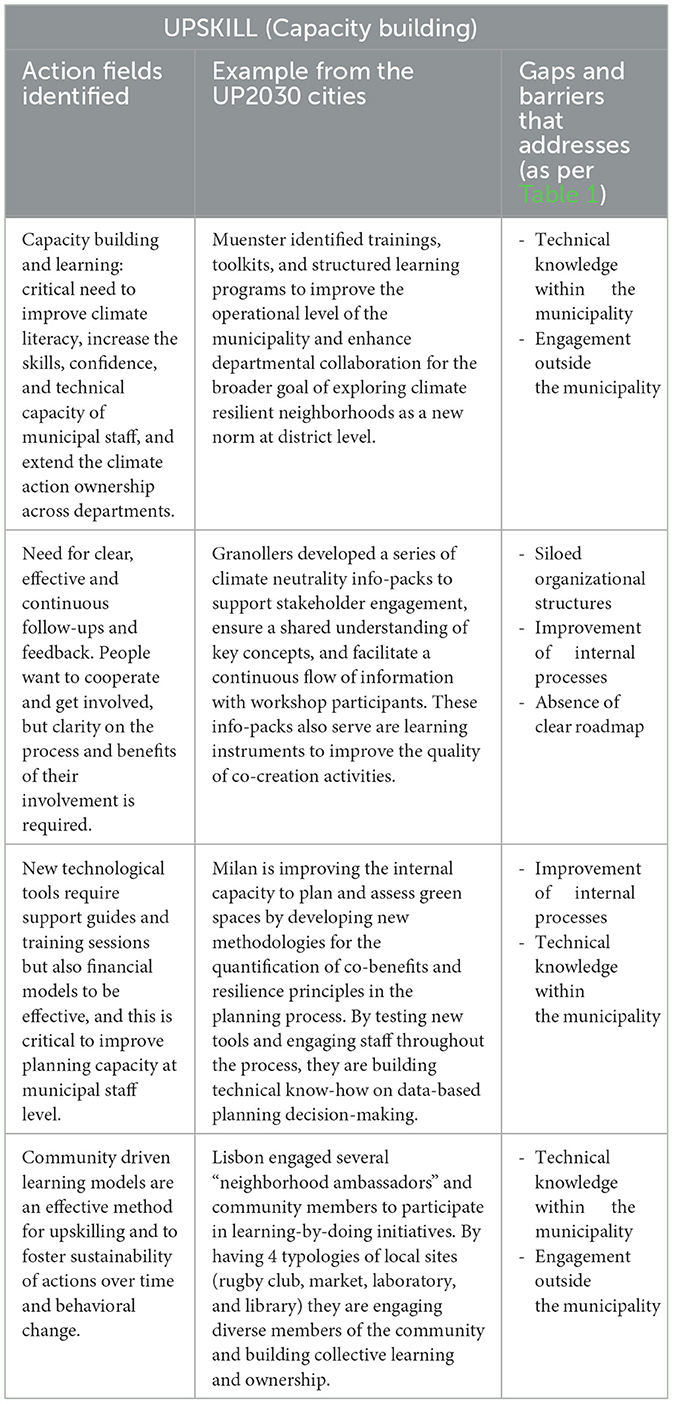
Table 3. Action fields and measures identified applying the 5-UP-UPSKILLING dimension against the identified barriers.
The UPGRADE dimension (Table 4), although not leading to direct infrastructure implementation in most cases, offered participating cities a valuable opportunity to adapt existing planning tools to their local contexts. It served as a critical step in paving the way for future tangible implementation by developing new policy documents, formalizing technical guidelines and endorsing them as regulatory or mandatory standards. Furthermore, this dimension enabled cities to establish new instruments designed to consolidate climate-related outcomes, tools, and institutional learning in a single, accessible manner. It also highlighted that gaps between policy adoption and implementation can also be due to the conditions of the existing infrastructure and the lack of conditions (Kwakye et al., 2024) and data.
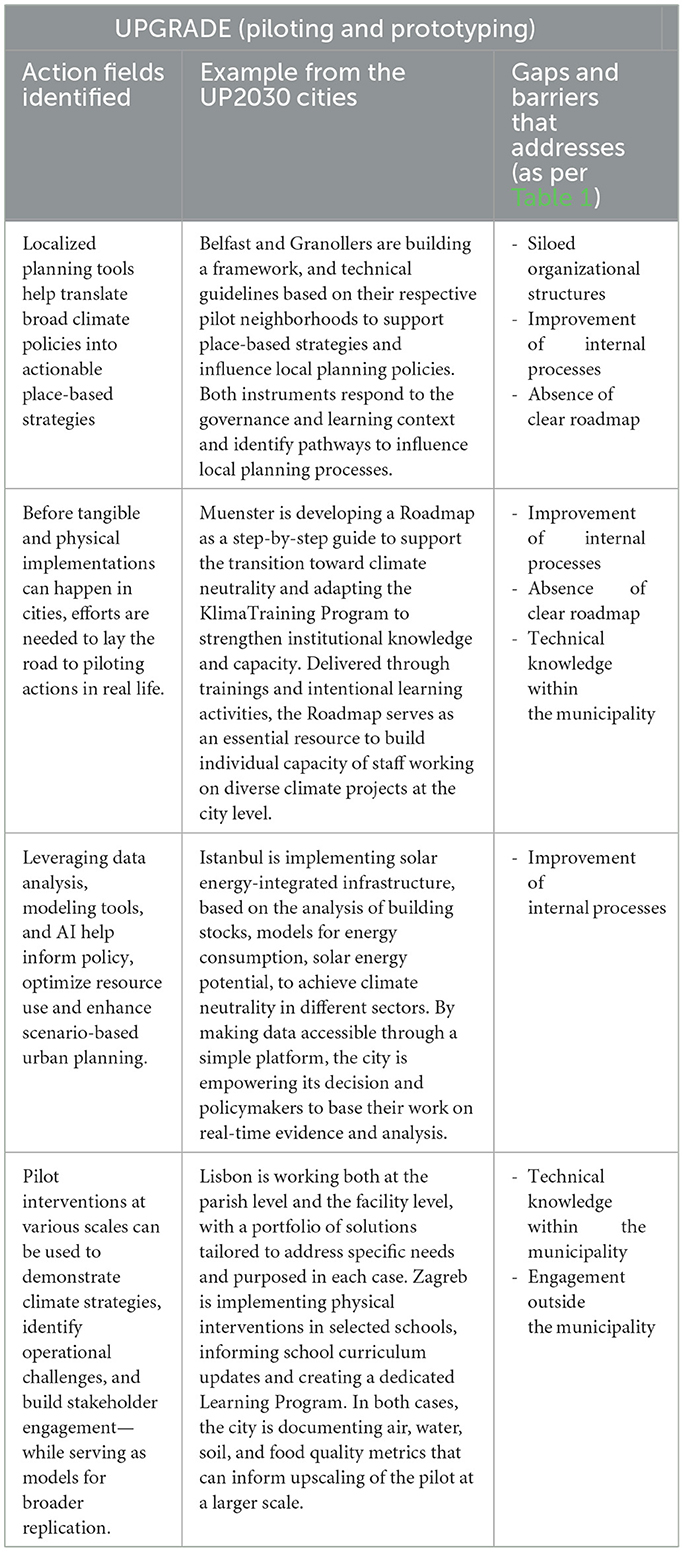
Table 4. Action fields and measures identified applying the 5-UP-UPGRADING dimension against the identified barriers.
The UPSCALE dimension (Table 5) offered cities an opportunity to reflect on the need to formalize climate action within official planning frameworks. For cities participating in the EU Mission for Climate-Neutral Cities by 2030, this meant embedding actions into CCCs; for others, it involved securing formal endorsement by local governing bodies. The process also highlighted the importance of identifying and preserving the legacy of short-term projects (such as the ones part of the Horizon Europe programme) to ensure that valuable insights and progress feed into long-term strategies, thereby minimizing fragmentation and promoting continuity. Additionally, the assessment demonstrated that bottom-up approaches to upscaling can be effective, particularly in contexts where municipal-level mechanisms are lacking. However, funding of in-situ implementation continues to be a need and an obstacle when moving forward toward implementing actions on climate neutrality and resilience.
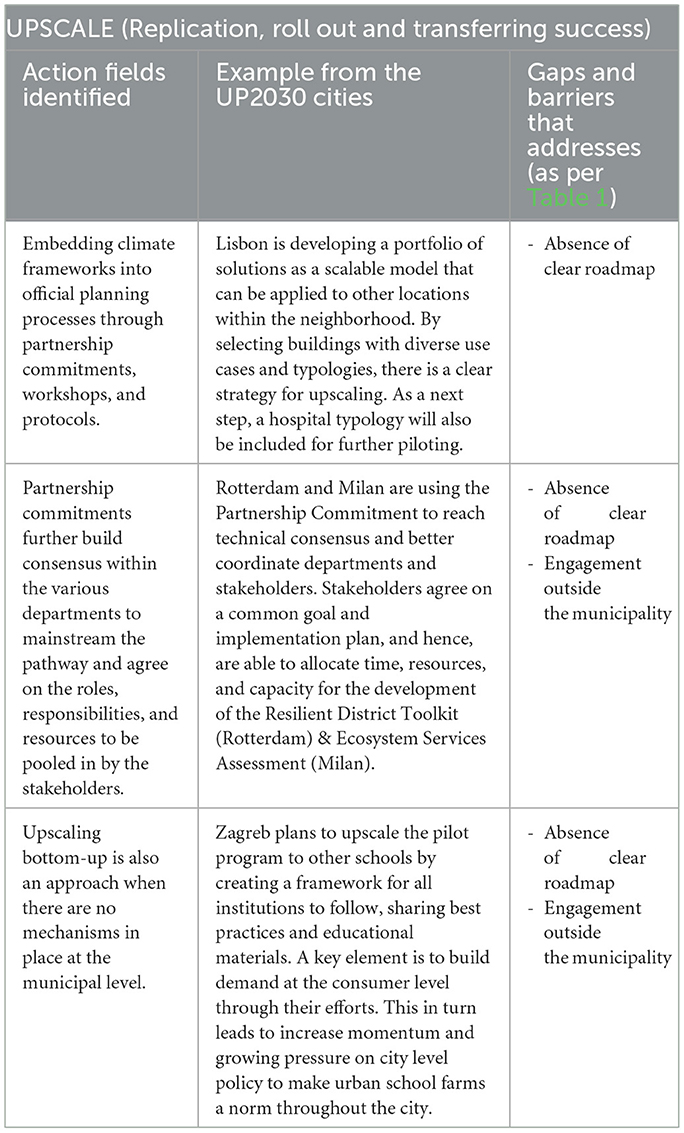
Table 5. Action fields and measures identified applying the 5-UP-UPSCALING dimension against the identified barriers.
The UPTAKE dimension (Table 6) underscored the importance of accessible knowledge and user-friendly resources in capturing attention, fostering engagement, and mobilizing key stakeholders. While cross-departmental collaboration remains essential, the process also emphasized the need for broader cooperation across sectors, including public institutions, private entities, civil society, and academia (Huovila et al., 2022). To mainstream climate action, the associated vocabulary must be clarified, demystified, and disseminated beyond specialized climate offices.
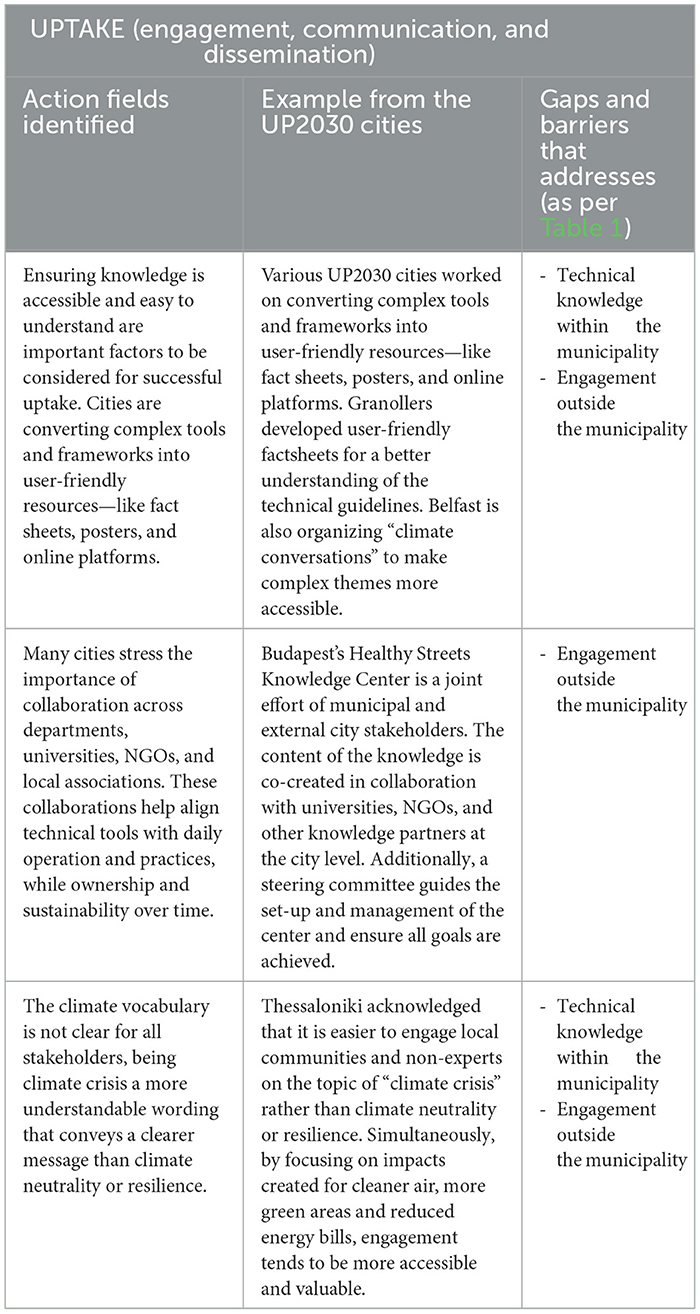
Table 6. Action fields and measures identified applying the 5UP-UPTAKING dimension against the identified barriers.
After applying the 5-UP Framework, cities found it easier to identify both their strengths and weaknesses in implementing measures for climate action. Figure 8 shows that although gaps and barriers remained, the framework helped clarify which areas require more work, where cities can capitalize on resources and knowledge, and what challenges hinder integrated and consistent climate action implementation. On a scale from 1 to 5, where 5 indicates the highest level of support or ease of action (Y axis), cities reported the most progress in the dimension of needs, policies, and instruments (UPDATE), with an average score of 3.6. Knowledge on climate action at the municipal level received the highest rating overall, with a score of 3.9. Regarding replication, roll out, and transfer (UPSCALE), cities found it relatively easier to identify new physical areas for intervention, scoring 3.5. In terms of engagement (UPTAKE), the receptiveness and understanding of climate action among external stakeholders also had a high score of 3.8. However, cities identified several critical areas where support is perceived to be lacking or where significant challenges remain. First, in the dimension of capacity building (UPSKILL), cities reported difficulty in implementing new tools within municipal structures, with a lower score of 2.6. Second, in piloting and prototyping (UPGRADE), the challenge of translating concepts into technical detail was highlighted, receiving a score of just 2.3. Finally, securing financing for upscaling, replication, or rolling out measures (UPSCALE) emerged as the greatest obstacle, with the lowest score reported (only 1.8).
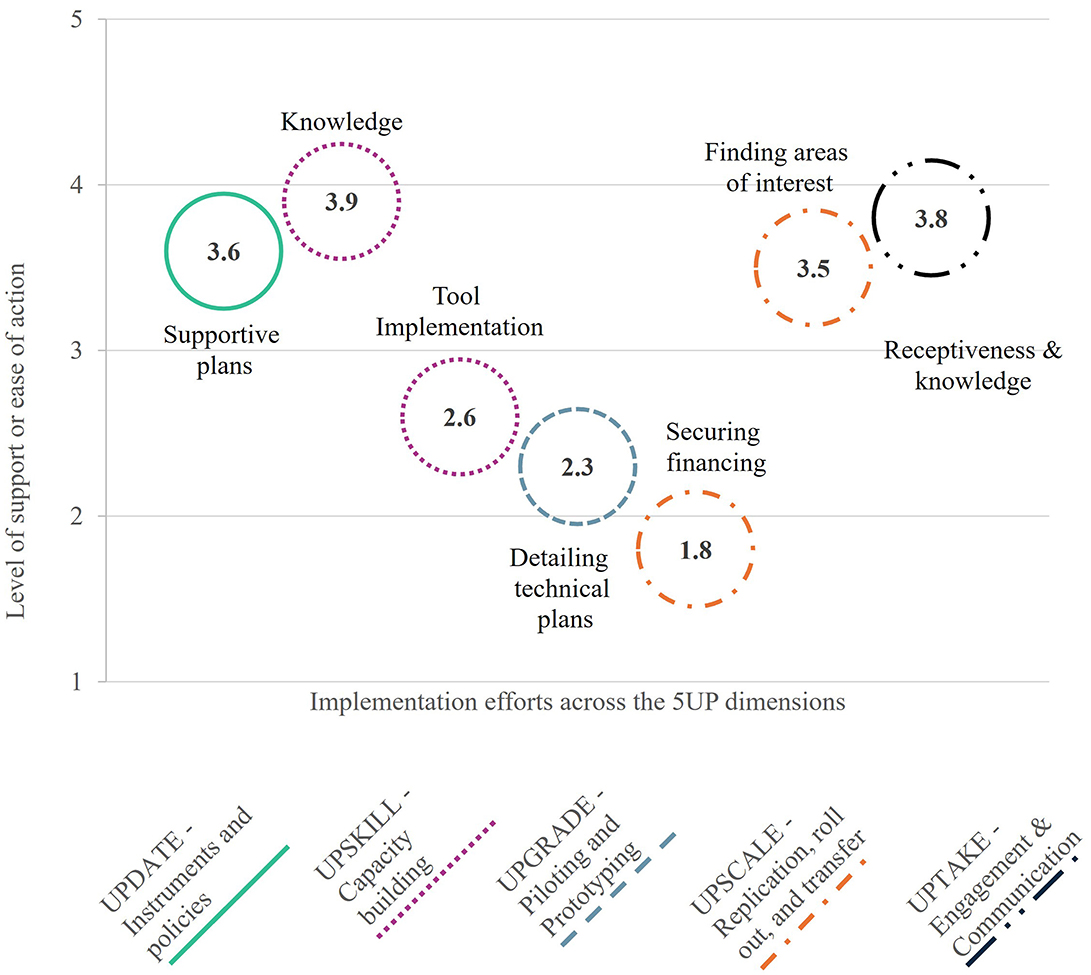
Figure 8. Assessment of the areas that could bridge the gap between climate policy and implementation.
While the 5-UP Framework seems logical and intuitive to urban planning processes, systemic approaches and the understanding of integrated action that considers mitigation, adaptation and social justice it is not always the way cities approach complex urban climate transitions. Several cities expressed that the methodology helped build capacity for collaboration in the municipality and have indicated plans to apply this methodology in future projects. The step-by-step approach, moving from needs to vision and then from action to upscale, was a new way of working and a valuable methodology to be applied across all departments.
4 Discussion
Consistent with existing literature, the research results from the 10 cities identified several recurring challenges: limited capacity to design and implement climate policies due to insufficient technical skills and understanding of climate frameworks (Grafakos et al., 2020; Reckien et al., 2023), difficulties in coordinating interdepartmental initiatives and sharing knowledge effectively (Stehle et al., 2022; Lwasa et al., 2023), bureaucratic procedures that hinder innovation (Kousky and Schneider, 2003; Ryan, 2015), and lack of long-term, structured planning, which often leads to fragmented or inconsistent action (Bulkeley et al., 2009; Sharifi, 2020; Chelleri and Baravikova, 2021).
The proposed 5-UP Framework helped cities better understand their climate action pathways and integrate mitigation and adaptation efforts, while also reflecting on social justice implications of such pathways. Overall, it fostered more coordinated efforts toward implementation of climate actions, moving beyond siloed projects toward integrated approaches.
The application of the 5-UPs showed that advancing climate action implementation at the local level requires coordinated efforts across multiple areas, something not consistently articulated in most municipalities. Cities must identify entry points to leverage both existing and emerging planning process (UPDATE), while simultaneously building skills, adopting new technologies, and strengthening institutional capacity (UPSKILL). They must also create opportunities for testing solutions, working both within and, when necessary, around regulatory barriers that hinder implementation (UPGRADE). Importantly, the process cannot end with testing: honest reflection on successes and failures, as well as the development of flexible governance models and financial mechanisms, is essential for enhancing impact (UPSCALE). The varied ways in which the 5-UP Framework was applied across cities also highlighted the value of peer-to-peer learning in identifying effective practices under different conditions; however it emphasizes the importance of in-depth learning moving beyond mere knowledge exchange (Haupt et al., 2020). Moreover, the engagement process emphasized the role of human agency: when local stakeholder are directly involved as agents of change, co-creative processes can reshape how climate action is understood and implemented (UPTAKE) (O'Brien, 2018). As highlighted in the case of Belfast, but also in the literature, equipping staff with the skills to communicate climate strategies in a clear and relatable way is a critical enabler of systemic change (Ennes et al., 2021).
Colleagues from Thessaloniki further illustrated the challenges of moving from planning to implementation, noting that “a critical sequence of additional steps that must follow the action plan's adoption: preparation of detailed technical studies, alignment with funding requirements, submission to appropriate financing bodies, and administrative approvals. This process often introduces significant delays and risks, particularly in cases where municipalities lack sufficient capacity, resources, or technical expertise to quickly translate strategic priorities into fundable, implementable projects” (Tsakiridou, I., personal communication, April 2025). This observation underscores that successful implementation of climate actions requires engaging with all dimensions of the 5-UP Framework, to prevent initiatives from remaining pilot projects or unfulfilled ideas, rather than becoming embedded in municipal practices. More broadly, climate action implementation falls shorts because, although targets and visions are established, the concrete steps and means for implementation are not guaranteed (Corfee-Morlot et al., 2012; Parks, 2020; Huovila et al., 2022). Before tangible outcomes can be achieved in cities, efforts are needed to lay the road for piloting actions in real contexts. This challenge is particularly acute in technologically driven projects, which can strain the technical and operational capacities of those involved, especially in municipal contexts where the skills and systems to manage, understand, and deploy new technologies may be limited (Borrás and Edler, 2020; Ranchod, 2020; Bundgaard and Borrás, 2021).
The systemic focus of the 5-UP Framework revealed how financial constraints (UPSCALE) and technical capacity gaps (UPSKILL) are deeply interconnected, as illustrated in Figure 8. Funding is central to advancing climate action implementation, but it is equally dependent on the technical understanding of the projects that municipalities wish to pursue. Public funding remains essential to initiate and guide low-carbon and climate-resilient investments. However, funding mechanisms need to be flexible enough to cover technical studies, detailed designs, and implementation activities to initiate impactful climate actions (Apostolovic et al., 2023). Addressing this issues is urgent, as the global infrastructure investment gap has steadily widened over recent decades, demanding more efficient use of limited financial resources and the strategic prioritization of investments across sectors and regions (Sánchez-Silva and Baker, 2024).
Although the 5-UP Framework may appear as a straightforward, step-by-step process, its real value lies in helping cities overcome the siloed and project-based approaches that often dominate policy implementation. Several cities reported that the methodology strengthened internal collaboration and built institutional capacity. Achieving long-term climate mitigation and adaptation goals will ultimately depend on robust coordination among local stakeholders and across all levels of governance (Landauer et al., 2019; Howarth et al., 2025), as well as recognition that mitigation and adaptation efforts need to be addressed together (IPCC, 2014). Peer-to-peer sessions held during the UP2030 project were consistently reported as valuable for guiding and providing feedback on city-level processes. Funding mechanisms like the EU's 100 Climate-Neutral Cities initiative, along with climate networks and continued research, are vital to ensuring that frameworks like the 5-UPs are not only explored but adopted, preventing climate action from becoming a temporary branding exercise (Huovila et al., 2022; Corrêa do Lago et al., 2023).
The flexibility of the 5-UP Framework, which deliberately avoids focusing on technical specifics, makes it possible to integrate mitigation, adaptation, and social justice considerations. Cities define and expect actions depending on their context, tailoring the framework to the most pressing needs, available resources, institutional capacity, and jurisdictional mandates. This flexibility is both an opportunity, as it enables cities to adapt the approach to advance their climate agendas, and a challenge, since the various factors required to achieve climate targets, as noted in the introduction and at the beginning of this section, cannot always be effectively aligned and would depend largely on cities' ability to recognize that mitigation, adaptation, and social justice need to be addressed together (Beretta and Bracchi, 2023).
While the research demonstrated clear benefits for the participating cities, the study also faced limitations. These include the novelty of the 5-UP Framework, the relatively small sample of ten cities, and the reliance on qualitative data from workshops, surveys, and focus groups, which may not capture the full complexity of implementation challenges across different governance contexts. Despite the size of the sample, the 10 cities that were part of the study presented diverse socio-economic and geographic characteristics, generating a richer understanding of outcomes as each city faced distinct challenges and opportunities. The 3-year research period made it possible to revisit results and refine the analysis of each UP dimension based on lessons learned in earlier phases of the project, improving the overall Framework. Future research could build on these findings by applying the 5-UPs in a larger number of cities, creating a more representative sample. It should also include cities at different stages of climate governance, with varying capacities for implementing mitigation and adaptation measures, as well as those already monitoring results, so that lessons can be transferred to cities just beginning their climate transitions allowing in-depth peer-to-peer learning (Haupt et al., 2020).
5 Conclusion
European cities are increasingly committing to ambitious climate neutrality visions, yet the transition from policy adoption to meaningful implementation remains a critical hurdle, particularly when climate resilience and social justice are not considered as part of the same package. The most critical barriers identified include organizational inefficiencies, siloed structures, insufficient technical knowledge, and the absence of clear roadmaps linking targets with implementation plans. These gaps create uncertainty over priorities and, combined with limited stakeholder engagement and economic constraints, slow down progress toward integrated climate action.
The 5-UP Framework helped the participant cities address these challenges by fostering a more systemic and coordinated approach to climate action implementation. By identifying needs and barriers (UPDATE), and necessary skills and tools (UPSKILL), testing solutions (UPGRADE), and identifying pathways for scaling and uptake (UPSCALE, UPTAKE), cities were able to better understand the importance of systemic action and to integrate mitigation, adaptation, and social justice as part of the climate action equation. Notably, the framework revealed how financial constraints and technical capacity gaps are deeply interlinked. At the same time, addressing the fragmentation of initiatives, which too often operate in isolation or lack longevity, is also essential for achieving sustained transformation.
With cities' growing awareness of climate change impacts and persistent implementation gaps, this study showed that support must extend beyond financing and project outputs. It should also guide capacity building, empower local actors, promote prototyping, and enable upscaling to mainstream climate action systemically. The experience of the 5-UP Framework demonstrates that cities can move beyond fragmented plans and isolated pilots toward sustained, systemic, and inclusive climate action but profound changes are necessary in the way that cities shape just, resilient, and carbon-neutral urban futures.
Data availability statement
The raw data supporting the conclusions of this article will be made available by the authors, without undue reservation.
Ethics statement
Ethical review and approval was not required for the study on human participants in accordance with the local legislation and institutional requirements. Across all activities, participant consent was obtained, and confidentiality was maintained.
Author contributions
CD: Writing – review & editing, Writing – original draft. NT: Writing – original draft, Writing – review & editing. ED: Writing – review & editing, Writing – original draft. LC: Writing – review & editing. CV: Writing – review & editing. FA: Writing – original draft, Writing – review & editing. LK: Writing – review & editing.
Funding
The author(s) declare that financial support was received for the research and/or publication of this article. This research was made possible thanks to the UP2030 project funded by Horizon Europe Innovation Actions from January 2023 to December 2025 under the Grant Agreement no. 101096405.
Acknowledgments
Special thanks to our colleagues in the 10 cities that participated in the research and validation of the 5-UP approach, listed alphabetically alongside their liaison partners: Belfast and Mapping for Change, Budapest and GGGI Hungary, Granollers and Aquatec SA, Istanbul and the Middle East Technical University (METU), Lisbon and Laboratorio Nacional de Engenharia Civil (LNEC), Milan and Links Foundation, Münster and University of Stuttgart IAT, Rotterdam and Resilient Cities Network, Thessaloniki and Major Development Agency Thessaloniki (MDAT), and Zagreb and Vessela Motika. Their contributions and work throughout the project and research were key to the results of this paper. Special thanks as well to Samruddhi Sathe and Salma Shrestha for their support during the literature review process.
Conflict of interest
The authors declare that the research was conducted in the absence of any commercial or financial relationships that could be construed as a potential conflict of interest.
Generative AI statement
The author(s) declare that no Gen AI was used in the creation of this manuscript.
Any alternative text (alt text) provided alongside figures in this article has been generated by Frontiers with the support of artificial intelligence and reasonable efforts have been made to ensure accuracy, including review by the authors wherever possible. If you identify any issues, please contact us.
Publisher's note
All claims expressed in this article are solely those of the authors and do not necessarily represent those of their affiliated organizations, or those of the publisher, the editors and the reviewers. Any product that may be evaluated in this article, or claim that may be made by its manufacturer, is not guaranteed or endorsed by the publisher.
References
Anguelovski, I., Connolly, J. J. T., Cole, H., Garcia-Lamarca, M., Triguero-Mas, M., Baró, F., et al. (2022). Green gentrification in European and North American cities. Nat. Commun. 13:3816. doi: 10.1038/s41467-022-31572-1
Apostolovic, M., Le Cornu, E., Masale, E., Maskrey, R., Schuler, N., and Teipelke, R. (2023). Improving Local Enabling Conditions for Private Sector Climate Investment in Cities.
Atkinson, R. (2008). European urban policies and the neighbourhood: an overview. Proc. Inst. Civil Eng. 161, 115–122. doi: 10.1680/udap.2008.161.3.115
Attride-Stirling, J. (2001). Thematic networks: an analytic tool for qualitative research. Qual. Res. 1, 385–405. doi: 10.1177/146879410100100307
Aust, H. P. (2019). The shifting role of cities in the global climate change regime: from Paris to Pittsburgh and back? Reciel 28, 57–66. doi: 10.1111/reel.12272
Baffoe, G. (2019). Understanding the neighbourhood concept and its evolution: a review. Environ. Urban. ASIA 10, 393–402. doi: 10.1177/0975425319859115
Beretta, I., and Bracchi, C. (2023). Climate-neutral and smart cities: a critical review through the lens of environmental justice. Front Sociol. 8:1175592. doi: 10.3389/fsoc.2023.1175592
Borrás, S., and Edler, J. (2020). The roles of the state in the governance of socio-technical systems' transformation. Res. Policy 49:103971. doi: 10.1016/j.respol.2020.103971
Bulkeley, H., Schroeder, H., Janda, K., Zhao, J., Armstrong, A., Chu, S. Y., et al. (2009). Cities and Climate Change: The Role of Institutions, Governance and Urban Planning.
Bundgaard, L., and Borrás, S. (2021). City-wide scale-up of smart city pilot projects: governance conditions. Technol. Forecast. Soc. Change 172:121014. doi: 10.1016/j.techfore.2021.121014
Chelleri, L., and Baravikova, A. (2021). Understandings of urban resilience meanings and principles across Europe. Cities 108:102985. doi: 10.1016/j.cities.2020.102985
Corfee-Morlot, J., Marchal, V., Kauffmann, C., Kennedy, C., Stewart, F., Kaminker, C., et al. (2012). Towards a Green Investment Policy Framework: The Case of Low-Carbon, Climate-Resilient Infrastructure. Paris: OECD Publishing.
Corrêa do Lago, A., Sánchez Chaparro, T., and Lumbreras, J. (2023). A decade of climate action and the mission towards climate neutrality and adaptation in European cities: delivering urban transformations? Sustainability 15:16665. doi: 10.3390/su152416665
Dodman, D., Hayward, B., Pelling, M., Castán Broto, V., Chow, W., Chu, E., et al. (2023). “Cities, settlements and key infrastructure,” in Climate Change 2022 – Impacts, Adaptation and Vulnerability: Working Group II Contribution to the Sixth Assessment Report of the Intergovernmental Panel on Climate Change, ed. Intergovernmental Panel on Climate Change (Cambridge: Cambridge University Press), 907–1040.
Dudley, E., Ashley, R., Manojlovic, N., van Herk, S., and Blanksby, J., (eds.). (2013). Learning and Action Alliances for Innovation and Active Learning in a European Context. Exeter: NovaTech.
Ennes, M., Lawson, D. F., Stevenson, K. T., Peterson, M. N., and Jones, M. G. (2021). It's about time: perceived barriers to in-service teacher climate change professional development. Environ. Educ. Res. 27, 762–778. doi: 10.1080/13504622.2021.1909708
Farla, J., Markard, J., Raven, R., and Coenen, L. (2012). Sustainability transitions in the making: a closer look at actors, strategies and resources. Technol. Forecast. Soc. Change 79, 991–998. doi: 10.1016/j.techfore.2012.02.001
Frantzeskaki, N., McPhearson, T., and Kabisch, N. (2021). Urban sustainability science: prospects for innovations through a system's perspective, relational and transformations' approaches : This article belongs to Ambio's 50th Anniversary Collection. Theme Urban. Ambio 50, 1650–1658. doi: 10.1007/s13280-021-01521-1
Geels, F. W. (2019). Socio-technical transitions to sustainability: a review of criticisms and elaborations of the multi-level perspective. Curr. Opin. Environ. Sustain. 39, 187–201. doi: 10.1016/j.cosust.2019.06.009
Grafakos, S., Viero, G., Reckien, D., Trigg, K., Viguie, V., Sudmant, A., et al. (2020). Integration of mitigation and adaptation in urban climate change action plans in Europe: a systematic assessment. Renew. Sustain. Energy Rev. 121:109623. doi: 10.1016/j.rser.2019.109623
Harcourt, R., Bruine de Bruin, W., Dessai, S., and Taylor, A. (2019). Investing in a good pair of wellies: how do non-experts interpret the expert terminology of climate change impacts and adaptation? Clim. Change 155, 257–272. doi: 10.1007/s10584-019-02455-0
Haupt, W., Chelleri, L., van Herk, S., and Zevenbergen, C. (2020). City-to-city learning within climate city networks: definition, significance, and challenges from a global perspective. Int. J. Urban Sustain. Dev. 12, 143–159. doi: 10.1080/19463138.2019.1691007
Howarth, C., McLoughlin, N., Murtagh, E., Kythreotis, A. P., and Porter, J. (2025). Integrating climate mitigation and adaptation in the UK: a new anticipatory narrative for achieving “Climate Resilient Net Zero” in preparing for heat risk. Glob. Environ. Change 92:102994. doi: 10.1016/j.gloenvcha.2025.102994
Huovila, A., Siikavirta, H., Antuña Rozado, C., Rökman, J., Tuominen, P., Paiho, S., et al. (2022). Carbon-neutral cities: critical review of theory and practice. J. Clean. Prod. 341:130912. doi: 10.1016/j.jclepro.2022.130912
IPCC (2014). “Summary for policymakers,” in Climate Change 2014: Impacts, Adaptation, and Vulnerability. Part A: Global and Sectoral Aspects. Contribution of Working Group to the Fifth Assessment Report of the Intergovernmental Panel on Climate Change, eds. C. B. Field, V. R. Barros, D. J. Dokken, K. J. Mach, M. D. Mastrandrea, E. T. Bilir, et al. (Cambridge: Cambridge University Press), 1–32.
Istrate, A.-L., Popartan, L.-A., Auerbach, J., Gaspari, J., and Tavangar, M. R. (2023). Collaborative research for transitioning to climate-neutral cities – contouring a prospective framework for integrated planning. Plann. Theory 24, 163–182. doi: 10.1177/14730952231183303
Kousky, C., and Schneider, S. H. (2003). Global climate policy: will cities lead the way? Clim. Policy 3, 359–372. doi: 10.1016/j.clipol.2003.08.002
Kwakye, J. M., Ekechukwu, D. E., and Ogundipe, O. B. (2024). Policy approaches for bioenergy development in response to climate change: a conceptual analysis. World J. Adv. Eng. Technol. Sci. 12, 299–306. doi: 10.30574/wjaets.2024.12.2.0292
Kythreotis, A. P., Jonas, A. E. G., and Howarth, C. (2020). Locating climate adaptation in urban and regional studies. Reg. Stud. 54, 576–588. doi: 10.1080/00343404.2019.1678744
Laine, J., Heinonen, J., and Junnila, S. (2020). Pathways to carbon-neutral cities prior to a national policy. Sustainability 12:2445. doi: 10.3390/su12062445
Landauer, M., Juhola, S., and Klein, J. (2019). The role of scale in integrating climate change adaptation and mitigation in cities. J. Environ. Plann. Manag. 62, 741–765. doi: 10.1080/09640568.2018.1430022
Liakou, L., Flanagan, B., Altman, N., Rendle, N., Kiernicka-Allavena, J., Wildman, A., et al. (2022). Report on City Needs, Drivers and Barriers Towards Climate Neutrality. Deliverable.
Lucchitta, B., Palermo, V., Melica, G., Molteni, T., Burro, A., Bertoldi, P., et al. (2023). Are European cities achieving emission reduction commitments? A comparative analysis under the Covenant of Mayors initiative. Heliyon 10:e23423. doi: 10.1016/j.heliyon.2023.e23423
Lwasa, S., Seto, K. C., Bai, X., Blanco, H., Gurney, K. R., Kilkiş, S., et al. (2023). “Urban systems and other settlements,” in Climate Change 2022 - Mitigation of Climate Change: Working Group III Contribution to the Sixth Assessment Report of the Intergovernmental Panel on Climate Change, ed. Intergovernmental Panel on Climate Change (Cambridge: Cambridge University Press), 861–952.
Maskrey, S., Vilcan, T., O'Donnell, E., and Lamond, J. (2020). Using learning and action alliances to build capacity for local flood risk management. Environ. Sci. Policy 107, 198–205. doi: 10.1016/j.envsci.2020.02.012
Naeem, M., Ozuem, W., Howell, K., and Ranfagni, S. (2023). A step-by-step process of thematic analysis to develop a conceptual model in qualitative research. Int. J. Qual. Methods 22:5789. doi: 10.1177/16094069231205789
Newman, R., Ashley, R., Molyneux-Hodgson, S., and Cashman, A. (2011). Managing water as a socio-technical system: the shift from ‘experts' to ‘alliances'. Proc. Inst. Civil En. Eng. Sustain. 164, 95–102. doi: 10.1680/ensu.1000032
O'Brien, K. (2018). Is the 1.5°C target possible? Exploring the three spheres of transformation. Curr. Opin. Environ. Sustain. 31, 153–160. doi: 10.1016/j.cosust.2018.04.010
O'Donnell, E. C., Lamond, J. E., and Thorne, C. R. (2018). Learning and action alliance framework to facilitate stakeholder collaboration and social learning in urban flood risk management. Environ. Sci. Policy 80, 1–8. doi: 10.1016/j.envsci.2017.10.013
Parks, D. (2020). Promises and techno-politics: renewable energy and Malmö's vision of a climate-smart city. Sci. Cult. 29, 388–409. doi: 10.1080/09505431.2019.1705274
Puppim de Oliveira, J. A. (2009). The implementation of climate change related policies at the subnational level: an analysis of three countries. Habitat Int. 33, 253–259. doi: 10.1016/j.habitatint.2008.10.006
Ranchod, R. (2020). The data-technology nexus in South African secondary cities: the challenges to smart governance. Urban Stud. 57, 3281–3298. doi: 10.1177/0042098019896974
Reckien, D., Buzasi, A., Olazabal, M., Spyridaki, N.-A., Eckersley, P., Simoes, S. G., et al. (2023). Quality of urban climate adaptation plans over time. npj Urban Sustain. 3:85. doi: 10.1038/s42949-023-00085-1
Rocco, R. (2022). “Spatial justice: a crucial dimension of sustainability,” in Teaching, Learning & Researching Spatial Planning, eds. R. Rocco, G. Bracken, C. Newton, and M. Dabrowski (Delft: TU Delft OPEN Publishing), 276–287.
Rogers, N. J. L., Adams, V. M., and Byrne, J. A. (2023). Factors affecting the mainstreaming of climate change adaptation in municipal policy and practice: a systematic review. Clim. Policy 23, 1327–1344. doi: 10.1080/14693062.2023.2208098
Ryan, D. (2015). From commitment to action: a literature review on climate policy implementation at city level. Clim. Change 131, 519–529. doi: 10.1007/s10584-015-1402-6
Sánchez-Silva, M., and Baker, J. W. (2024). Dynamic infrastructure systems: advancing sustainable urbanization and climate change. Environ. Syst. Decis. 44, 489–499. doi: 10.1007/s10669-024-09969-8
Seto, K. C., Churkina, G., Hsu, A., Keller, M., Newman, P. W., Qin, B., et al. (2021). From low- to net-zero carbon cities: the next global agenda. Annu. Rev. Environ. Resour. 46, 377–415. doi: 10.1146/annurev-environ-050120-113117
Seto, K. C., Golden, J. S., Alberti, M., and Turner, B. L. (2017). Sustainability in an urbanizing planet. Proc. Natl. Acad. Sci. U. S. A. 114, 8935–8938. doi: 10.1073/pnas.1606037114
Sharifi, A. (2020). Trade-offs and conflicts between urban climate change mitigation and adaptation measures: a literature review. J. Clean. Prod. 276:122813. doi: 10.1016/j.jclepro.2020.122813
Song, K., Burley Farr, K., and Hsu, A. (2024). Assessing subnational climate action in G20 cities and regions: progress and ambition. One Earth 7, 2189–2203. doi: 10.1016/j.oneear.2024.10.001
Stehle, F., Hickmann, T., Lederer, M., and Höhne, C. (2022). Urban climate politics in emerging economies: a multi-level governance perspective. Urbanisation 7, S9–S25. doi: 10.1177/2455747120913185
Turnheim, B., Kivimaa, P., and Berkhout, F. eds. (2018). Innovating Climate Governance: Moving Beyond Experiments. Cambridge: Cambridge University Press.
Keywords: climate action implementation, climate systemic approaches, urban planning, climate governance, socio-technical transitions, technical capacity
Citation: Diaz C, Tajuddin N, Deshayes E, Chelleri L, Vera C, Aili F and Kapetas L (2025) Addressing climate-action implementation gaps in cities: planning for meaningful and consistent implementation through the 5-UP framework. Front. Sustain. Cities 7:1649194. doi: 10.3389/frsc.2025.1649194
Received: 18 June 2025; Accepted: 09 October 2025;
Published: 31 October 2025.
Edited by:
Sujit Sikder, Leibniz Institute for Ecological Urban and Regional Development (IOER), GermanyReviewed by:
Andrew Paul Kythreotis, University of Lincoln, United KingdomRohit Mondal, Polytechnic of Milan, Italy
Copyright © 2025 Diaz, Tajuddin, Deshayes, Chelleri, Vera, Aili and Kapetas. This is an open-access article distributed under the terms of the Creative Commons Attribution License (CC BY). The use, distribution or reproduction in other forums is permitted, provided the original author(s) and the copyright owner(s) are credited and that the original publication in this journal is cited, in accordance with accepted academic practice. No use, distribution or reproduction is permitted which does not comply with these terms.
*Correspondence: Catalina Diaz, Y2F0YWxpbmEuZGlhekBpYW8uZnJhdW5ob2Zlci5kZQ==
 Catalina Diaz
Catalina Diaz Nilofer Tajuddin
Nilofer Tajuddin Eloïse Deshayes
Eloïse Deshayes Lorenzo Chelleri
Lorenzo Chelleri Constanza Vera
Constanza Vera Federico Aili
Federico Aili Leon Kapetas
Leon Kapetas